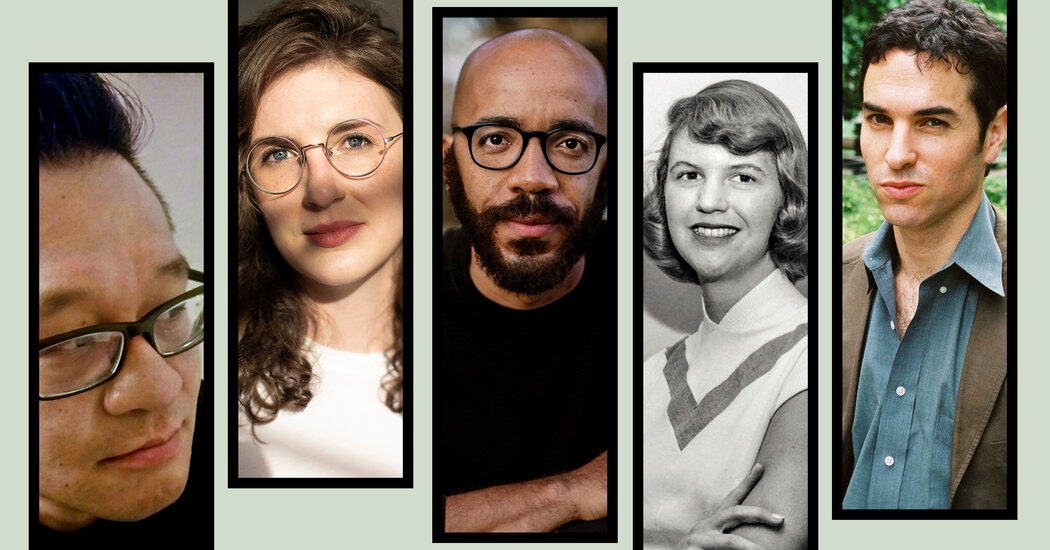
The film studio A24 recently came out with a cookbook, “Horror Caviar,” which includes the pastry chef Natasha Pickowicz’s recipe for a white chocolate mousse and walnut dacquoise torte (try saying that fast five times in a row). The photographs of the smashed torte, its bright red jam oozing, make it look both delicious and macabre. I can’t wait to make it, and to see “Possession,” the film from 1981 that inspired it.
YOUNG I like to keep the voices in my head company with other voices, often in podcast form. I stockpile episodes of Open Source and then listen nonstop on days when I have to machete my way through a jungle of household chores. I suggest starting with the episode featuring Cornel West and Susannah Heschel or the conversation with Rebecca Solnit about George Orwell. The host, Christopher Lydon, is a generous and spirited interlocutor who can talk about anything. Anything! Sometimes I try to think up topics that might stump him and then inevitably find an episode on that exact topic lurking in the archives.
Whenever a new episode of Alex Kaschuta’s Subversive Podcast appears, I contort my entire schedule to fit it in. As with many of the best things in life, it costs money — you need to subscribe to access the full library — but some episodes are available for free, so you can try a little taste on your podcast app of choice and see if you like it.
JACOBS On the contrary, finally watching “The Crown” made me want to read everything I could on English royalty, a subject that hasn’t attracted me since I was, oh, 9? Specifically Prince Philip and Wallis Simpson, both itchy outsiders who played along up to a point. (No desire to see the “Diana” musical, though, even before reading Jesse Green’s review in the Times — this seems like the epitome of too soon.) And not unrelatedly, I look forward all weekend to “Succession,” and the morning-after analysis on Twitter.
Any reading plans already on the horizon for 2022?
JACOBS My father was a psychiatrist who after his death left behind a remarkable professional library, including works by Bruno Bettelheim, Julian Jaynes and Jeffrey Masson (known for that decadelong libel case against The New Yorker over a profile of him by Janet Malcolm, who died herself this year). So I’d like to devote part of ’22 to sorting through that. Actually I need to, because it’s taking up a lot of shelf space. Analyze that!
SZALAI Even though J.M. Coetzee has written some of my favorite novels — books that seemed to shift my center of gravity, so that the world as I understand it has looked different ever since — I’ve been putting off reading his Jesus trilogy (the first volume appeared in 2013). Part of it had to do with the usual dull reasons of not getting around to something, time being the big one — or at least the big excuse. But now that I’ve had my sense of time distorted and in some ways destroyed by this pandemic, I no longer want the weeks to melt into years without experiencing the last decade of his work.
GARNER Next up for me is Anne Moody’s 1968 memoir, “Coming of Age in Mississippi,” which I’ve only just learned about. My friend the satire freak tells me I must track down a copy of James Dugan’s 19th-century book “Doctor Dispachemquic” (say it out loud), a forgotten medical satire that’s subtitled: “A Story of the Great Southern Plague of 1878.” What this friend says, I do.
YOUNG I’d like to amass a little pile of Japanese crime fiction in translation. At the top of the pile will be “Out,” by Natsuo Kirino — I’ve been told by a friend with expertise in the genre that the book is “cold and flatly described, occasionally violent and cruel but not operatic about it,” and that when the crime at the center of the plot is solved I will be imbued with the uneasy feeling that it is symptomatic of a larger social problem. Sign me up!



